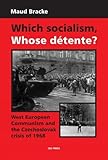Which Socialism, Whose Detente? : West European Communism and the Czechoslovak Crisis of 1968 / Maud Bracke.
Material type: TextPublisher: Budapest ; New York : Central European University Press, [2022]Copyright date: ©2007Description: 1 online resource (416 p.)Content type:
TextPublisher: Budapest ; New York : Central European University Press, [2022]Copyright date: ©2007Description: 1 online resource (416 p.)Content type: - 9786155211263
- 324.244/07509046
- HX238.5 B73 2007eb
- online - DeGruyter
| Item type | Current library | Call number | URL | Status | Notes | Barcode | |
|---|---|---|---|---|---|---|---|
 eBook
eBook
|
Biblioteca "Angelicum" Pont. Univ. S.Tommaso d'Aquino Nuvola online | online - DeGruyter (Browse shelf(Opens below)) | Online access | Not for loan (Accesso limitato) | Accesso per gli utenti autorizzati / Access for authorized users | (dgr)9786155211263 |
Browsing Biblioteca "Angelicum" Pont. Univ. S.Tommaso d'Aquino shelves, Shelving location: Nuvola online Close shelf browser (Hides shelf browser)

|

|

|

|

|

|

|
||
| online - DeGruyter The Long Journey of Gracia Mendes / | online - DeGruyter National Romanticism : The Formation of National Movements / | online - DeGruyter The View from Prague : The Expectations of World Leaders at the Dawn of the 21st Century / | online - DeGruyter Which Socialism, Whose Detente? : West European Communism and the Czechoslovak Crisis of 1968 / | online - DeGruyter The Poet and the Idiot / | online - DeGruyter Narratives Unbound : Historical studies in post-communist Eastern Europe / | online - DeGruyter The Coming Spring / |
Frontmatter -- Contents -- Acknowledgements -- Introduction -- 1. West European Communism and Internationalism Theoretical and Analytical Framework -- Part I. West European Communism And Internationalism, 1956–1967 -- Introduction -- 2. West European Communism and the Changes of 1956 -- 3. West European Communism and Internationalism 1962–1967 -- Part II. The Prague Spring, The Invasion, The Dissent -- Introduction -- 4. West European communism and the Prague Spring: reform and détente -- 5. Invasion, Dissent, Crisis -- 6. Normalization and Realignment -- Part III. The Consequences Internationalism After Czechoslovakia -- Introduction -- 7. Resetting Internationalism 1969–1970 -- 8. Internationalism and Eurocommunism in the 1970s -- General Conclusions. Internationalism, Détente, Revolution -- Abbreviations -- Primary sources -- Bibliography -- Index
restricted access online access with authorization star
http://purl.org/coar/access_right/c_16ec
This study analyzes the impact of the Czechoslovak crisis of 1968–1969 on the two major communist parties in the West: the Italian and French ones. Discusses the central strategic and ideological tensions which these parties needed to deal with: domestic belonging versus allegiance to the world communist movement, doctrinal orthodoxy in a context of rapid societal changes, and the question of revolution and reform. These key problems were situated in different contexts: the crisis in the "world communist movement" after 1956 and the Sino-Soviet rift, socio-economic modernization and political radicalization in Western Europe, and the shift from Cold War to early détente on the European continent. The research for this work is based on the study of a large collection of recently released primary sources, particularly, the internal records of various communist parties in Europe.
Mode of access: Internet via World Wide Web.
In English.
Description based on online resource; title from PDF title page (publisher's Web site, viewed 29. Jul 2022)


